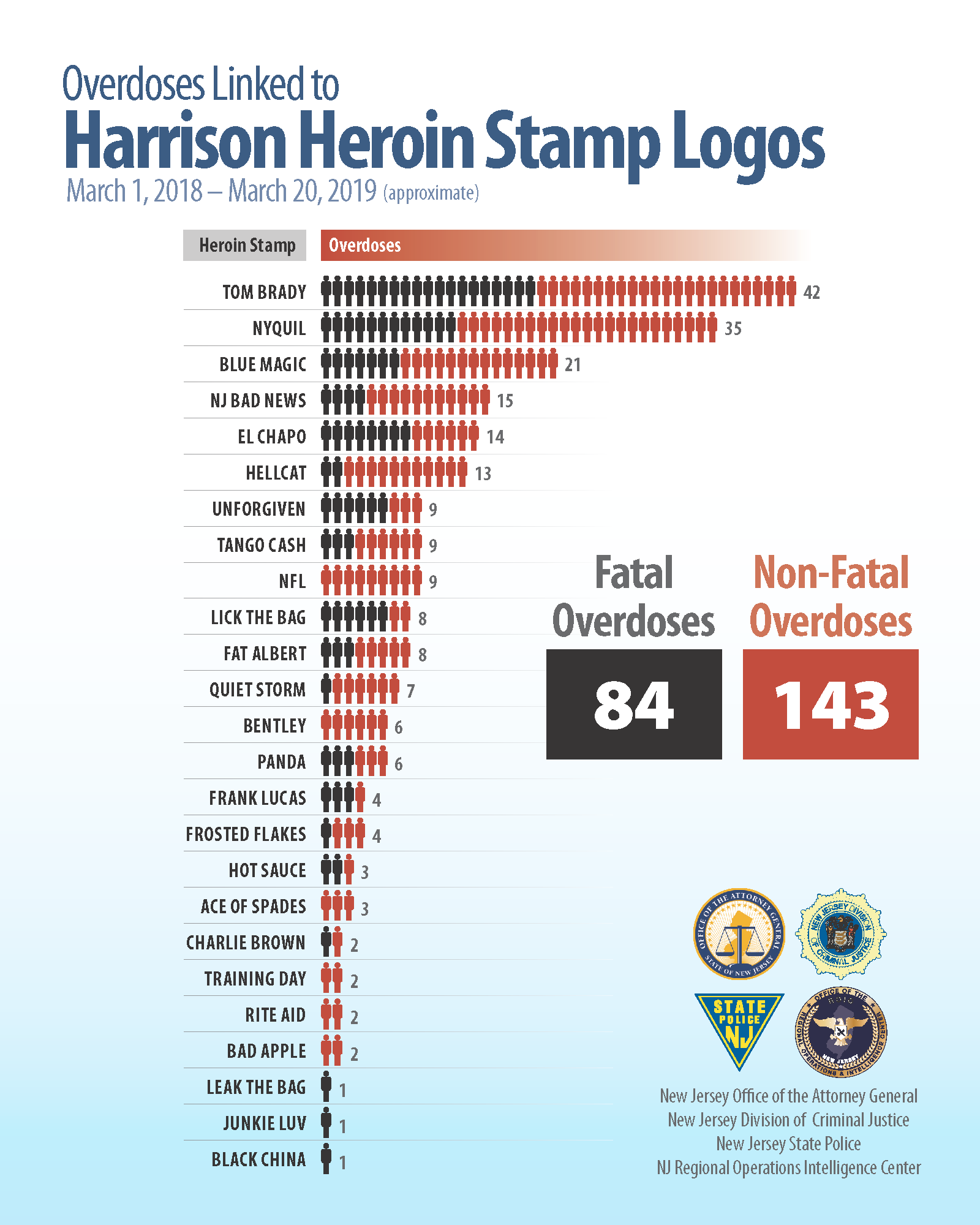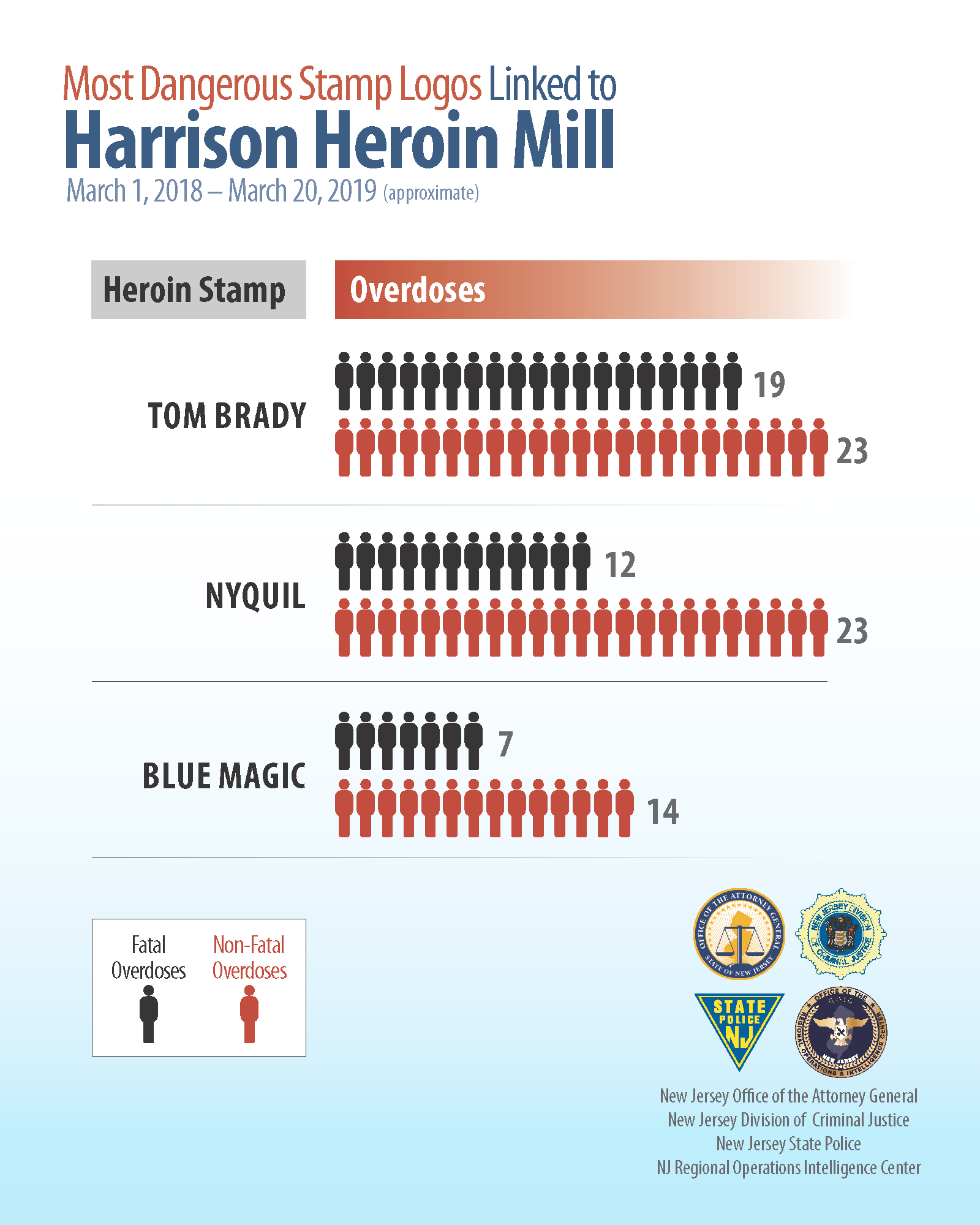Stamps used to brand drugs at mill in Harrison bear same brand names linked to 84 deaths
Arrests made in investigation led by NJ State Police Opioid Enforcement Task Force, New Jersey Division of Criminal Justice, and Law Enforcement Partners
For Immediate Release:
Office of The Attorney General
– Gurbir S. Grewal, Attorney General
New Jersey State Police
– Colonel Patrick Callahan, Superintendent
Division on Criminal Justice
– Veronica Allende, Director
For Further Information:
Media Inquiries-
Peter Aseltine
609-292-4791
Citizen Inquiries-
609-984-5828
TRENTON – Attorney General Gurbir S. Grewal today announced arrests of three men in the takedown of a major fentanyl and heroin mill in Harrison, N.J., that distributed its narcotics in wax folds stamped with the same brand names that have been linked to 227 overdoses, including 84 deaths. Approximately 32,500 individual doses and four kilos of fentanyl and heroin were seized in the investigation.
The arrests were made in an ongoing investigation by the New Jersey State Police Opioid Enforcement Task Force and the Division of Criminal Justice. They were assisted by U.S. Homeland Security Investigations, the U.S. Drug Enforcement Administration, Bergen County Prosecutor’s Office, Morris County Prosecutor’s Office, Morris County Sheriff’s Office, Passaic County Prosecutor’s Office, Passaic County Sheriff’s Office, Cliffside Park Police, Nutley Police, Harrison Police and Newark Police.
The New Jersey State Police recently established the Opioid Enforcement Task Force, designed to strategically target heroin and fentanyl sources of supply across the state. In October, the Department of Law & Public Safety, New Jersey State Police, was awarded a $2.8 million grant for this Task Force from the Department of Justice, Office of Community Oriented Policing Services (COPS), Anti-Heroin Task Force Program.
Based on the evidence seized, it is estimated that the drug mill, set up in a luxury apartment at 300 Somerset Street in Harrison, was supplying 15,000 doses of fentanyl and heroin per day. Timothy Guest, 45, of Irvington, N.J., allegedly operated the mill with associates working under him, including William Woodley, 27, of Belleville, N.J., and Selionel Orama, 25, of Cedar Grove, N.J. Those men were arrested on Thursday, March 14. They face first- and second-degree drug charges, including a charge of maintaining a narcotics production facility.
“We prevented countless doses of fentanyl and heroin from reaching drug users by taking down this mill, and given that the stamps seized bear the same names as drugs linked to 84 deaths, we may have saved many lives,” said Attorney General Grewal. “This operation reflects a proactive and collaborative strategy in which we recently deployed a new State Police task force, supported by a $2.8 million federal COPS grant, to target drug mills and other major drug sources as choke points in the supply line of these deadly opioids. This case is an early and tremendous victory for the Opioid Enforcement Task Force and our new strategy.”
“This investigation represents a significant advancement in the State Police’s capacity to conduct large scale narcotics investigations due to the recently created Opioid Enforcement Task Force. This task force coupled with the analytical capabilities of the Drug Monitoring Initiative represent a powerful deterrent to the illegal narcotics trade in New Jersey and the region,” said Colonel Patrick Callahan, Superintendent of the New Jersey State Police. “I commend the efforts of the detectives, analysts, and forensic experts from the State Police as well as our local and county partners.”
“We are collaborating in investigations like this one to target the drug traffickers who are fueling the deadly opioid epidemic gripping New Jersey,” said Director Veronica Allende of the Division of Criminal Justice. “This investigation moved very swiftly after information was developed establishing a potential link between the drugs being supplied by this mill and numerous overdose deaths.”
“The opioid epidemic is a national crisis with local implications across New Jersey that has left a trail of death and destroyed families,” said Brian Michael, Special Agent in Charge for HSI, Newark. “As long as there is supply and demand, these drug pushers will continue to flood our streets with these highly addictive, lethal drugs. The results of this investigation would not have been possible without the seamless intelligence and information sharing between Homeland Security Investigations, New Jersey State Police, and local law enforcement.”
Susan A. Gibson, Special Agent in Charge of the Drug Enforcement Administration’s New Jersey Division said, “The amount of heroin and fentanyl that was seized during this investigation could have resulted in many overdoses and deaths. It is investigations like this one that make a large, positive impact on the community. We will continue to work with our law enforcement partners to bring to justice those who choose to put our citizens in danger.”
The New Jersey State Police Opioid Enforcement Task Force was conducting surveillance in the area of the mill in Harrison on March 14 when they saw Guest leave the apartment building with a black duffel bag suspected to contain drugs and enter a Cadillac XTS. When State Police attempted to stop the Cadillac, Guest allegedly fled, striking two occupied troop cars. The Cadillac became disabled and detectives placed Guest under arrest. Meanwhile, Woodley and Orama fled from the mill building and also were arrested.
Investigators found 150 bricks of fentanyl in the black duffel bag in the Cadillac XTS. A brick consists of 50 individual doses of narcotics packaged in wax folds. Inside the drug mill, they seized three kilograms of fentanyl, one kilogram of heroin mixed with fentanyl, 500 bricks of fentanyl (approximately 25,000 individual doses containing fentanyl packaged for distribution), and drug milling equipment, including 29 coffee grinders, kilo presses, wax folds, and respirator masks. They also found 43 rubber ink stamps used to stamp brands on the wax folds. Information obtained from police reports throughout the state indicates that 25 of those stamps bear the same brand names that have been linked to a total of 227 overdoses, including 84 fatal overdoses.
“We know that our state is home to far too many people struggling with addiction,” said Attorney General Grewal. “But we ask that, no matter what challenges you’re facing in your life, if you see heroin stamped with these markings, please, please stay away from it. Your next fix could be your last.”
“If you encounter any of these stamps, please notify law enforcement,” continued Attorney General Grewal. “Many departments and County Prosecutors across our state allow individuals to turn in drugs and paraphernalia, no questions asked.”
At a second location in Secaucus that allegedly was used by Guest as a “stash house” to store proceeds from his illicit narcotics distribution, investigators seized approximately $200,000 in cash, a Bentley convertible worth an estimated $400,000, and a Range Rover worth an estimated $130,000.
Guest, Woodley and Orama are charged with the following offenses:
- Maintaining a Narcotics Production Facility (1st degree)
- Possession of Heroin with Intent to Distribute (1st degree)
- Possession of Fentanyl with Intent to Distribute (2nd degree)
- Possession of Fentanyl (3rd degree)
- Possession of Drug Paraphernalia (4th degree)
Guest is also charged with third-degree eluding police. Guest is being held in jail pending a detention hearing. Woodley and Orama were released subject to conditions following detention hearings.
Deputy Attorneys General Philip Mogavero and Angel Hector are the lead prosecutors for this investigation for the Division of Criminal Justice Gangs & Organized Crime Bureau, under the supervision of Bureau Chief Lauren Scarpa Yfantis and Deputy Bureau Chief Cynthia Vazquez.
Detective Jason Wiswesser is the case agent for this investigation for the New Jersey State Police Gangs and Organized Crime North Unit, under the supervision of Detective Sgt. Hugo Ribeiro. Sgt. Miguel Holgiun participated in the investigation for the NJSP Regional Operations Intelligence Center.
The New Jersey State Police Trafficking North Unit, Hazardous Material Response Unit, Crime Scene Investigation Unit and Crime Suppression North Unit assisted in the operation.
Attorney General Grewal thanked all of the agencies participating in the Opioid Enforcement Task Force and all of the other agencies that assisted in this investigation.
To target the most deadly packaging facilities and other heroin and fentanyl sources of supply, and reduce overdoses and fatalities, the Opioid Enforcement Task Force works with the NJSP Regional Operations Intelligence Center. In addition to NJSP members, the Task Force is comprised of task force officers from local, county and state partners. The Task Force also works cooperatively with the DEA and U.S. Homeland Security Investigations to further its mission.
First-degree charges carry a sentence of 10 to 20 years in state prison and a fine of up to $200,000. The first-degree charge of maintaining a narcotics production facility carries a mandatory minimum term without parole equal to one-third to one-half of the sentence imposed and a fine of up to $750,000. Second-degree charges carry a sentence of five to 10 years in prison and a fine of up to $150,000, while third-degree charges carry a sentence of three to five years in prison and a fine of up to $15,000, or $35,000 for the drug charge. Fourth-degree charges carry a sentence of up to 18 months and a fine of up to $10,000.
The complaints are merely accusations and the defendants are presumed innocent until proven guilty.
###



